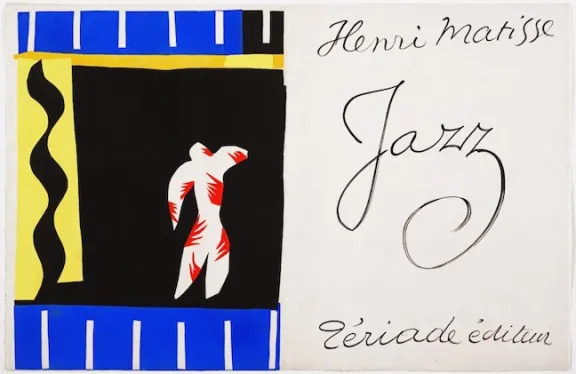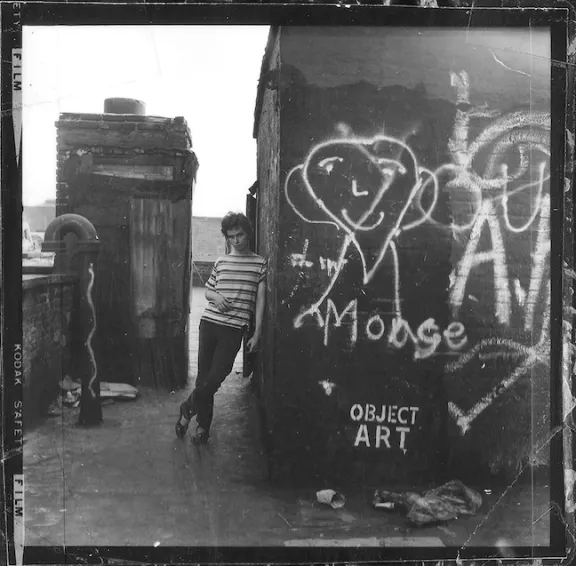Historical Item
Witch-Wife Exhibit is a Dreamscape (2016)
Co-Working Witch Wives: Swoon and Monica Canilao at Chandran Gallery
The artistic pair collaborate on a site-specific dreamscape for their new show at Chandran Gallery.
By Sarah Burke Feb 17, 2016
East Bay Express
Swoon's 24th St. Wheatpaste Gets Refreshed (2012)
The Mission’s Beloved Swoon, Parts I & II
by Molly Oleson January 11, 2012
Mission Local
A red Dodge Ram truck pulls up to the curb on Hampshire Street at the corner of 24th,…
Read moreNew Image of the 2009 Stencilada Exhibit
Jane Verma, one of the metal artists that designed and fabricated the CELLspace Metal Mural back in 2009, just sent us a stitched photo of the whole work, along with the…
Read moreTagger, Born Again, Preaches On
The Story Behind Sydney’s ‘Eternity’ Graffiti
Kaushik Patowary, AmusingPlanet
For over twenty five years, from 1930 to…
Read more1947 Matisse Pochoir Book at SF's de Young
Go to the de Young's site for tickets and images. Show up until 6 July, 2025.
In the final decades of a prolific career, modern artist Henri Matisse (…
Read moreNeanderthal Hand Stencils Dated in Spain
Neanderthals created hand stencil rock art over 66,000 years ago, U-series dating reveals
Dario Radley
(Link)
A discovery in Maltravieso Cave, located in Extremadura, Spain, has fundamentally challenged long-held beliefs about the origins of human artistic expression.
Neanderthals created hand stencil rock art over 66,000 years ago, U-series dating reveals
Researchers have determined that hand stencils in the cave date back over 66,000 years, suggesting that Neanderthals, rather than modern humans, were the world’s first artists. This revelation highlights the advanced cognitive and cultural capabilities of Neanderthals.
Classic Spolvero (stencil pouncing or dusting)
The technique of dusting: how the greats of the Renaissance executed paintings
by Redazione , published on 30/09/2020
From Finestre sull' Arte
One of these techniques was to cast with an awl: the tip of the tool was passed through the paper to leave a groove on the surface. For geometrically patterned decorations, the pierced mold technique could then be used: the design was traced on a sort of stencil through which the contours of the figures could be etched on the surface.
Tommy Lanigan-Schmidt’s Impact on 1960s New York’s Streets
Stencil Archive is always looking for stories and photographs to fill in the many gaps of lost/forgotten/unnoticed history relating to stencils in the streets. Brooklyn…
Read moreAmerican Civil War Soldier Graffiti
While a serious online archive is coming that "will provide scholars, students, and the public access to the graffiti and a reasonably large collection of ancillary archival material associated with the graffiti," Dr. Stephen Robertson has a basic website up that does a great job discussing types of Civil War-era graffiti, mapping the examples, giving interpretations, and even featuring some of the soldiers who marked up walls. Below is Dr. Robertson's text from his About page. Make sure to navigate the drop-down links under the "Types of Graffiti" to see photos. - Stencil Archive
Atlanta Embracing Graffiti Artists
Atlanta BeltLine Embraces Graffiti Artists Amid Changing Urban Landscape
As graffiti morphs from real estate blight to urban amenity, Atlanta’s style writers are driving forces in a conversation about public art.
By Brentin Mock
bloomberg.com (Link to original)
Jun 01, 2024 01:15
The graffiti-slathered Krog Street Tunnel exists at a collision between old and new Atlanta. On one end, its entrance sits blocks away from the Sweet Auburn district, birthplace of civil rights legend Martin Luther King, Jr. and the site of his tomb. On the other end are Cabbagetown, once home to mill workers, and Reynoldstown, founded by formerly enslaved African Americans, both of which have undergone dramatic neighborhood change.





